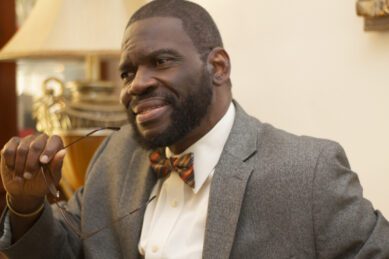Democracy & Governance
Minister Uju Kennedy-Ohanenye, Domestic Violence Victim Dr. Adenike Olubiyi, and Children Need Urgent Help -By John Egbeazien Oshodi
Training programs for law enforcement officers, healthcare professionals, and social workers are crucial. Education and awareness facilitate early intervention and support for victims, ensuring they receive the assistance they need promptly. Government involvement is pivotal in providing hotlines, counseling services, and legal aid. These services, coordinated and funded by relevant ministries, offer comprehensive support to those in need.

Ensuring Safety and Justice: Joining Forces with Minister Uju Kennedy-Ohanenye, Federal Ministry of Women Affairs and Social Development, in the Urgent Support for Domestic Violence Victim Dr. Adenike Olubiyi and Her Children
In a recent Vanguard news article dated October 22, 2023, Dr. Adenike Olubiyi, a 44-year-old lecturer at Ekiti State University, bravely shared her harrowing experience with domestic violence in an interview. Married to the reportedly suspended Chief Medical Director of Ekiti State Specialist Hospital, Dr. Olaolu Olubiyi, Dr. Adenike detailed the physical abuse and threats she endured, leading her to seek separation and safety for herself and her three children.
Despite attempts to manage the situation and reconcile, the violence escalated, culminating in a terrifying incident on September 14 where Dr. Adenike was attacked and hospitalized. During this incident, she was nearly strangled to death, suffering a neck fracture that still requires her to wear a collar for support. Her bravery in escaping this situation saved her life, with a stranger in her compound calling the police for assistance.
Dr. Adenike disclosed that her husband’s extramarital affair further strained their marriage, leading to their separation.
Despite enduring years of abuse, she sought to shield her children from the violence, but the impact on their mental health became unbearable. Witnessing their mother’s abuse left them emotionally unstable, emphasizing the urgent need for therapy and support for the entire family.
The urgency of Dr. Adenike Olubiyi’s case cannot be overstated. We must stand together to support her, Minister Uju Kennedy-Ohanenye, and the Federal Ministry of Women Affairs and Social Development is needed urgently in ensuring her safety and justice and that of her children.
In this situation, it’s crucial to recognize the psychological characteristics commonly associated with domestic violence perpetrators. Abusers often exhibit low self-esteem, attempting to exert control due to feelings of inadequacy. They seek to dominate every aspect of their partner’s life, becoming jealous, possessive, and manipulative. Lack of empathy, substance abuse, rigid gender roles, and a history of witnessing or experiencing domestic violence contribute to their abusive behavior.
In the intricate landscape of domestic violence, abusers commonly exhibit a series of detailed traits. Their actions are often rooted in deep-seated psychological issues, creating a complex dynamic that underlines the abusive behavior.
Abusers frequently suffer from profound feelings of inadequacy and powerlessness. To compensate, they attempt to assert control over others, particularly their partners, as a means to boost their fragile self-worth.
This desire for control extends to dominating every facet of their partner’s life, dictating actions, choices, and interactions. Victims often find themselves in a suffocating environment, stripped of their autonomy and independence.
Additionally, abusers exhibit extreme jealousy and possessiveness, perceiving any interaction their partner has with others as a threat. This irrational jealousy leads to controlling behavior, isolating the victim from their social circle, and baseless accusations of infidelity.
Furthermore, abusers often possess a strong sense of entitlement, believing they are deserving of special treatment and unwavering obedience. When their unreasonable demands are not met, they resort to violence, reinforcing their need for control.
Abusers are skilled manipulators, employing techniques like emotional manipulation and gaslighting. By distorting the truth, they confuse their victims, making it arduous for them to discern reality from the fabricated narratives, further eroding their self-confidence.
A profound lack of empathy characterizes abusers. They remain indifferent to the pain and fear they inflict, enabling them to continue their abusive behavior without remorse or guilt.
Many abusers come from backgrounds where they either witnessed or were victims of domestic violence. This exposure normalizes abusive behavior, perpetuating the vicious cycle of violence across generations.
Substance abuse exacerbates abusive tendencies, lowering inhibitions and leading to heightened aggression and violent outbursts, escalating the danger faced by the victim.
Some abusers grapple with mood disorders, which, when combined with other factors, result in violent episodes. Mood swings and impulsivity further complicate the situation, making their behavior unpredictable and dangerous.
Abusers rigidly adhere to traditional gender roles, using these beliefs to justify their abusive actions. They believe they have the right to dominate their partners, reinforcing their controlling behavior.
Frequent lying and deceit characterize abusers, enabling them to maintain control, deny their abusive behavior, downplay its severity, or blame the victim. This manipulation isolates the victim, making it challenging for them to seek help and escape the abusive relationship.
Moreover, abusers might display intermittent acts of kindness, especially after episodes of violence, drawing victims back into the relationship. This cycle of kindness followed by violence creates confusion, making it difficult for victims to break free. Recognizing these detailed traits is crucial in understanding the multifaceted nature of domestic violence, enabling the development of effective strategies to support victims and intervene with abusers, aiming for lasting solutions and a safer environment for everyone involved.
Victims of domestic violence are incredibly diverse and can encompass people from all walks of life, regardless of age, gender, socioeconomic status, or background. Despite this diversity, certain common characteristics are observed among victims of domestic violence:
Low self-esteem often plagues victims due to the relentless emotional and psychological abuse inflicted upon them by their abusers. The constant demeaning behavior erodes their self-worth and confidence.
Abusers frequently employ isolation tactics, cutting victims off from their friends, family, and social support networks. Consequently, victims become socially withdrawn and isolated, making it incredibly challenging to seek help or escape the abusive situation.
Living in perpetual fear of their abusers, victims often experience heightened levels of anxiety, depression, and various other mental health issues. This continuous emotional turmoil deeply affects their overall well-being.
Economic dependence on the abuser can act as a significant barrier to leaving the abusive relationship. Financial constraints make it challenging for victims to establish independence, trapping them in the cycle of abuse. Emotional dependence, especially when children are involved, can compel victims to return to the abuser in the hope of positive change, only to face renewed and often worsened abuse.
Victims frequently deny or minimize the abuse, sometimes rationalizing the abuser’s behavior or convincing themselves that they deserve the mistreatment. This distorted self-perception further complicates their ability to seek help.
Victims of domestic violence often bear physical signs such as bruises, cuts, and other injuries, which serve as visible proof of the abuse they endure. These marks are a grim testament to the violence inflicted upon them. In some cases, victims may attempt to conceal these injuries using various methods such as wearing sunglasses indoors, using makeup to cover bruises, or resorting to other means of disguising the visible evidence of their suffering. These efforts to hide the abuse highlight the fear and shame that victims often feel, further underscoring the urgency of addressing domestic violence and providing support to those affected.
Victims often undergo behavioral changes, becoming more withdrawn, anxious, or depressed. They may also exhibit signs of hyper-vigilance or jumpiness, reflecting their constant state of fear and anticipation of harm.
In cases of severe and prolonged abuse, victims may develop symptoms of Post-Traumatic Stress Disorder (PTSD). These symptoms can include debilitating flashbacks, nightmares, and severe anxiety, further highlighting the profound psychological impact of domestic violence.
Understanding these common characteristics is crucial in identifying and assisting victims effectively. It emphasizes the importance of providing comprehensive support and resources tailored to the unique challenges faced by domestic violence survivors, irrespective of their background or circumstances.
Approaching victims of domestic violence with empathy, understanding, and unwavering support is paramount.
Providing them access to safe spaces, counseling services, legal assistance, and a robust support network is essential to help them break free from the cycle of abuse and rebuild their lives. Addressing domestic violence is a collective societal effort that necessitates raising awareness, supporting victims, and holding perpetrators accountable.
In the pursuit of justice, law enforcement agencies and professional associations must conduct thorough investigations free from interference, bribery, or influence. Justice should be blind to an individual’s profession or social standing, emphasizing the importance of transparency, accountability, and upholding the law for a fair resolution in domestic violence cases.
Led by Barrister Uju Kennedy, the Federal Ministry of Women Affairs and Social Development plays a pivotal role in addressing domestic violence effectively.
The ministry, alongside relevant government authorities, shapes policies, raises awareness, and allocates resources to support victims of domestic violence. Ensuring equal rights and protection for women, children, and all victims is at the heart of their mission.
Establishing safe spaces, such as shelters and safe houses, is a fundamental step in providing victims with the physical and emotional refuge they need. These spaces shield victims from immediate danger and serve as a foundation for rebuilding their lives. Accessible therapy and counseling services are indispensable for victims dealing with trauma, anxiety, and depression, aiding their healing and emotional recovery.
Financial support allocated by the Ministry of Women Affairs can be directed towards establishing shelters, funding counseling services, providing legal aid, and supporting educational programs aimed at preventing domestic violence. Government officials are crucial advocates for stricter laws against domestic violence and must ensure the effective enforcement of existing laws while closing legal loopholes that perpetrators might exploit.
Nationwide awareness campaigns are imperative to educate the public about domestic violence, its signs, and available resources. By reducing the stigma associated with domestic violence, these campaigns encourage more victims to seek help. Training programs for law enforcement officers, healthcare professionals, and social workers are vital to handling domestic violence cases sensitively and effectively. Early intervention and support are essential components of these initiatives.
Government involvement ensures the availability of hotlines, counseling services, and legal aid for victims. Coordination and funding by relevant ministries ensure comprehensive support for those in need.
The Minister of Women Affairs, in her role, ensures justice prevails, overseeing cases impartially and holding perpetrators accountable, irrespective of their social standing. Swift action, including the arrest of the suspect, filing of charges, court appearance, and possible temporary remand or bail with an order to stay away from the victim and the children, is crucial. Such measures are essential to protecting victims and ensuring the safety and well-being of those affected by domestic violence.
Swift and decisive action by the Ministry of Women Affairs establishes a safe environment for victims, conveying a powerful message that domestic violence will not be tolerated, reinforcing the importance of safety, justice, and dignity for all victims. Establishing secure hiding places, legal restraining orders, anonymous relocation services, and community resources such as hotlines and support groups further strengthen the protective measures for victims, creating avenues for them to escape the cycle of abuse and rebuild their lives with confidence and security.
Empowering victims of domestic violence requires a multifaceted approach involving various sectors of society. By establishing safe spaces, therapy options, and secure hiding solutions, victims can escape abusive situations and rebuild their lives with confidence and hope. Collaborating with NGOs and local organizations is crucial in setting up safe shelters equipped with necessary resources and staffed by trained professionals who can provide immediate support and counseling.
Close collaboration with law enforcement agencies and the courts is essential to ensure strong protection measures for victims. This may involve enforcing restraining orders, conducting regular police patrols in areas with high domestic violence rates, and establishing quick response mechanisms to aid victims in distress. Providing legal aid through partnerships with legal organizations empowers victims to take legal actions against their abusers, giving them a voice in the legal system.
Incorporating mental health professionals into the support network is vital.
Counseling and therapy services, especially trauma-informed counseling, play a significant role in helping victims and their children heal emotionally. Nationwide awareness campaigns are essential to educate the public about domestic violence, reducing the associated stigma and encouraging more victims to seek help.
Training programs for law enforcement officers, healthcare professionals, and social workers are crucial. Education and awareness facilitate early intervention and support for victims, ensuring they receive the assistance they need promptly. Government involvement is pivotal in providing hotlines, counseling services, and legal aid. These services, coordinated and funded by relevant ministries, offer comprehensive support to those in need.
Moreover, establishing specialized domestic courts staffed with crisis counselors under the Ministry of Women Affairs is a valuable initiative. These specialized courts focus exclusively on domestic violence cases, ensuring victims receive timely and sensitive assistance. By collaborating with crisis counselors, these courts offer holistic support, addressing both the legal and emotional needs of victims. This comprehensive approach enhances the effectiveness of the justice system, handling domestic violence cases with utmost care, empathy, and expertise. Such support significantly empowers victims and holds perpetrators accountable for their actions, fostering a society where domestic violence is not tolerated, and victims are provided the necessary resources and support to rebuild their lives.
Under the Ministry of Women’s Affairs, Social Development, and Children Services, in alliance with the judiciary, the creation of specialized domestic courts staffed with crisis counselors emerges as a comprehensive approach to effectively address domestic violence. These counselors act as intermediaries between victims and the legal system, law enforcement agencies, schools, and other relevant entities, ensuring sensitive conduct of legal proceedings and providing victims with essential information and emotional support throughout the legal process. They facilitate communication between victims and law enforcement, ensuring thorough investigation and accountability for perpetrators.
Crisis counselors collaborate closely with schools to bolster the well-being of children affected by domestic violence, coordinating services such as therapy, academic support, and counseling to help children cope with trauma. Serving as case managers, these counselors oversee victims’ holistic well-being, coordinating a range of services from therapy and legal aid to housing assistance, ensuring victims have access to comprehensive support systems.
In the fight against domestic violence, specialized domestic courts and crisis counselors play pivotal roles. These courts exclusively handle domestic violence cases, providing victims with the attention and sensitivity they deserve, becoming central hubs where various services converge to create a supportive environment. They transform into safe spaces where victims can seek justice, protection, and healing.
Crisis counselors guide victims through the legal process, ensuring their understanding of rights and providing emotional support during court proceedings. They bridge the communication gap between victims and legal professionals, collaborating with law enforcement to ensure proper investigation and victim protection. Additionally, they act as advocates for children affected by violence, coordinating therapeutic services, academic assistance, and counseling in collaboration with schools.
In the broader context, the fight against domestic violence involves collaboration among the police, courts, and government ministries. Prompt police responses, thorough investigations, enforcement of restraining orders, and connecting victims with support services are essential. Courts handle legal proceedings, issue protection orders, decide child custody matters, and provide a platform for victims’ legal advocacy. Ministries and government bodies develop policies, allocate resources, conduct awareness campaigns, offer professional training, coordinate support services, and advocate for stricter laws.
Through this collaborative effort, these entities work together to combat domestic violence, prioritizing victim safety and ensuring perpetrators are held accountable. Amidst the prevalence of domestic violence, the establishment of specialized domestic courts with crisis counselors offers an innovative and essential solution, providing victims with comprehensive support to escape abusive situations and rebuild their lives. This approach underscores the crucial roles of specialized courts and crisis counselors in assisting victims and holding perpetrators accountable.

John Egbeazien Oshodi
Professor John Egbeazien Oshodi, who was born in Uromi, Edo State, Nigeria, to a father who served in the Nigeria police for 37 years, is an American-based police and prison scientist and forensic, clinical, and legal psychologist. A government consultant on matters of forensic-clinical psychological services in the USA; and a former interim associate dean and assistant professor at Broward College, Florida. The Founder of the Dr. John Egbeazien Oshodi Foundation, Center for Psychological Health and Behavioral Change in African Settings. In 2011, he introduced state-of-the-art forensic psychology into Nigeria through N.U.C. and Nasarawa State University, where he served in the Department of Psychology as an Associate Professor. He has taught at various universities and colleges including Florida memorial University, Florida International University, Broward college, Lynn University, and a contributing faculty member at the Weldios university in Benin Republic, Nexus International University, Uganda, Nova Southeastern University and Walden University in USA. He is a Human Rights Psychologist with a focus on African related environments. john.oshodi@mail.waldenu.edu




















